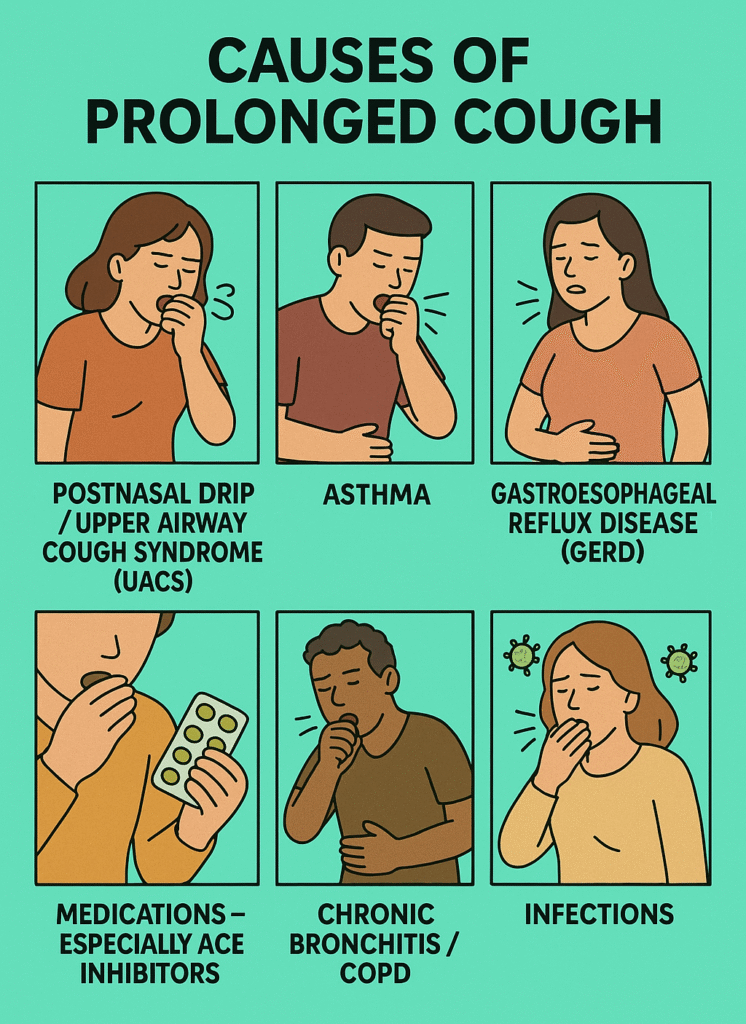What is a Prolonged Cough?
We’ve all had a cough that overstayed its welcome. But when does a cough stop being “just a cough” and become something worth looking into?
A prolonged cough—also called a chronic cough—is one that lasts more than 8 weeks in adults or 4 weeks in children. It can be dry or produce phlegm, and while it might seem harmless at first, it can interfere with sleep, cause exhaustion, or even signal something more serious.
According to global health data, chronic cough affects around 10% of the adult population worldwide. In some regions, it’s even more common—especially where air pollution, smoking, or untreated allergies are part of daily life.
How Does It Happen?
To understand why a cough won’t go away, let’s take a peek inside your respiratory system.
Imagine your airways as a clean hallway. When irritants like dust, smoke, or infections come in, your body triggers the cough reflex—an automatic response to clear out the “mess.”
Now, if your hallway keeps getting dirt blown in—or the walls themselves become damaged (like in asthma or reflux)—your body keeps triggering that same reflex. But instead of being helpful, it becomes chronic.
The science, made simple:
- Cough receptors in your airways detect irritants.
- These send signals to your brain’s cough centre.
- Your brain then tells your chest muscles and lungs to push air out—hard.
- Over time, even gentle triggers like cold air, perfume, or talking can set it off in someone with a “sensitised” cough reflex.
What Causes a Prolonged Cough?
A persistent cough isn’t a disease itself—it’s a symptom. Here’s what might be going on underneath:
Main Causes of Prolonged Cough:
- Postnasal Drip / Upper Airway Cough Syndrome (UACS)
- Roughly 40% of cases
- Mucus from your nose drips down the back of your throat, tickling nerves and triggering a cough. It often happens with allergies or sinus infections.
- Asthma
- 20–25% of cases
- Especially a type called cough-variant asthma where coughing is the only symptom—no wheezing or shortness of breath.
- Gastroesophageal Reflux Disease (GERD)
- Up to 20% of cases
- Acid from the stomach creeps up into the throat and irritates the airways, especially at night or after meals.
- Medications – especially ACE inhibitors
- 5–10% of cases in patients taking blood pressure meds
- A dry, persistent cough is a well-known side effect.
- Chronic bronchitis / COPD
- Seen more in smokers or those exposed to workplace pollutants.
- Infections that linger
- Sometimes a cold or flu damages your airways, and the cough reflex stays active for weeks—even after you feel better.
- Other causes
- Including lung cancer, tuberculosis, heart failure, and interstitial lung diseases—these are rarer but serious.
So if your cough isn’t going away, it’s important not to shrug it off. It might be trying to tell you something.

Who’s Most at Risk?
Anyone can get a prolonged cough, but some people are more likely to develop it based on their health, environment, or habits.
Top Risk Factors:
- Smoking (active or passive) – irritates and damages the airways over time.
- Chronic allergies – especially dust mites, pollen, or animal dander.
- Living in polluted cities – air quality plays a major role.
- History of asthma or childhood respiratory infections
- Frequent heartburn or acid reflux
- Medications like ACE inhibitors
- Occupational exposure – working around dust, chemicals, or fumes.
If you check more than one box above and your cough has stuck around for weeks, it’s time to pay closer attention.
What Other Symptoms Can Happen?
At first, a long-lasting cough might seem harmless—but it rarely comes alone.
Common Accompanying Symptoms:
- Throat clearing or a sensation of mucus dripping
- Wheezing or chest tightness
- Hoarseness or sore throat
- Fatigue from interrupted sleep
- Shortness of breath
Signs the Condition May Be More Serious:
- Coughing up blood
- Unexplained weight loss
- Fever that doesn’t go away
- Night sweats
- Persistent chest pain
These symptoms may signal something more serious like lung cancer, tuberculosis, or heart failure—and should prompt urgent medical evaluation.
How is a Prolonged Cough Diagnosed?
Doctors don’t usually jump straight to a CT scan. Instead, they’ll start with a conversation and a step-by-step approach.
The Gold Standard Tests:
- Chest X-ray
A simple, painless scan to rule out infections, tumours, or lung collapse. - Lung function tests (spirometry)
Blowing into a device helps assess asthma or COPD. - Trial treatments
Doctors may prescribe antihistamines or acid-reducing meds to see if the cough improves—this can help narrow the cause. - Additional tests (if needed):
- Sinus CT scan
- 24-hour pH monitoring (for reflux)
- Bronchoscopy (to look inside your airways)
Expect your doctor to ask about medications, smoking, pets, workplace exposure, and sleep position—they all hold clues.
How is Prolonged Cough Treated?
Thankfully, most chronic coughs can be resolved—once the root cause is found.
Gold Standard Treatment:
- Postnasal drip: Nasal sprays, antihistamines, decongestants.
- Asthma: Inhalers (bronchodilators and corticosteroids).
- GERD: Lifestyle changes (e.g., avoiding late meals), plus acid reducers (like omeprazole).
- ACE-inhibitor cough: Switching to a different blood pressure medication.
Other Options:
- Cough suppressants: For short-term relief if sleep is affected (e.g., dextromethorphan).
- Speech therapy: For a sensitised cough reflex.
- Treating underlying disease: COPD, infections, or rare autoimmune conditions.
The key? Don’t self-medicate for weeks. If your cough hasn’t improved after 3–4 weeks, it’s time to seek answers.
References
- Chronic Cough in Adults: Diagnosis and Management. American Family Physician, American Academy of Family Physicians, 2017. https://www.aafp.org/pubs/afp/issues/2017/0201/p199.html
- Global Epidemiology of Chronic Cough: A Systematic Review and Meta-analysis. The Lancet Respiratory Medicine, 2022. https://doi.org/10.1016/S2213-2600(21)00496-X
- Evaluation of Chronic Cough. Mayo Clinic, 2023. https://www.mayoclinic.org/symptoms/chronic-cough/basics/definition/sym-20050846
